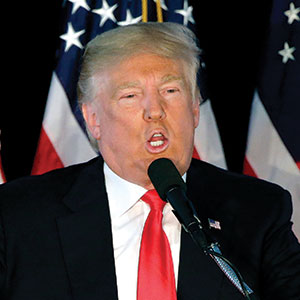Polling data shows that Catholic voters continued to support Donald Trump (pictured) after Pope Francis criticised him, albeit not by name, for proposing to build a wall between the United States and Mexico.
According to a Reuters/Ipsos poll, the leading Republican contender for the US presidency averaged 47.9 per cent of Catholic Republicans in the 50 days since the Pope made the comment on 18 February, up from 39.8 per cent in the 50 days that preceded it. Much of that change, however, is also due to the fact that in January, there were still 12 candidates running in the Republican primary, and by March there were only three left.
Professor Stephen Schneck, who teaches politics at the Catholic University of America, said the poll needed to be seen in context. “We do not have good polling on Catholic voters for this primary season,” Professor Schneck told The Tablet. “Exit polling and general surveys have largely ignored asking about religious denomination, except for efforts to identify evangelical Christians. Nevertheless from the little evidence that we do have, Catholic voters appear to be refracted in surprising ways for both political parties.”
Catholic Republicans, like all Republicans, are increasingly supporting the New York real estate mogul. “Areas of the country where there is a sizable Catholic working class white population went more strongly for Trump than happened elsewhere,” noted Professor Schneck. This was despite the fact that “Trump’s plans for building a wall to block undocumented immigrants from Latin America and forbidding even travel of Muslims to the US … have been criticised by prominent clerics such as Cardinal Timothy Dolan of New York.”
The exit polls for the Democratic Party’s primary in New York did ask about a range of religious identifications. Catholics, who accounted for 26 per cent of the electorate, back the former Secretary of State Hillary Clinton (below) over Senator Bernie Sanders by a margin of 62 per cent to 38 per cent.
That margin was wider than Mrs Clinton’s victory among all voters, 57 per cent to Mr Sanders’ 43 per cent. Just as Mr Trump seems not to have been penalised by Catholic voters because of the Pope’s remarks, Mr Sanders seems not to have benefitted from his trip to the Vatican, four days before the New York primary, to speak at a conference on social justice. Mr Sanders had a brief meeting with Francis.
Mr Sanders, who cites Pope Francis’ commitment to social justice and environmental protection in his stump speeches, did best among the “nones” – those who, when asked their religious affiliation, reply “none”. This cohort accounted for 25 per cent of New York Democratic voters and Mr Sanders won them by 57 per cent to Mrs Clinton’s 43 per cent. Among Protestants, Mrs Clinton won 65 per cent to Mr Sanders’ 35 per cent. Professor Schneck also noted that Mrs Clinton does far better than Mr Sanders among Latino voters, and a majority of them are Catholic.
Robert P. Jones of the Public Religion Research Institute (PRRI) says that in looking ahead to the general election it is more important to look at whether voters have a largely “favourable” or “unfavourable” impression of a given candidate, and how each candidate fares among voters of the same party, as opposed to polls that include voters from the other party and those who identify with neither party. PRRI conducted a poll this month that showed “Hispanic Catholics are far more likely than white Catholics to hold favourable views of both Clinton (73 per cent against 27 per cent) and Sanders (62 per cent against 36 per cent),” according to Dr Jones. “Head to head among Democratic and Democratic-leaning Catholic voters, Clinton leads Sanders 52 per cent to 42 per cent.”
On the Republican side, Dr Jones told The Tablet: “Among Republican and Republican-leaning Catholic voters, 38 per cent support Trump, 30 per cent support his main rival Ted Cruz, and 23 per cent the third remaining GOP contender John Kasich.” Mr Trump’s and Mr Cruz’s unfavourable numbers among Hispanic Catholics are so high, however, that “if there is no major shift in their stances and outreach to the Latino community, we could see Hispanic support for the Republican nominee drop below 20 per cent, almost certainly putting the White House out of reach”.
“One remarkable pattern,” says Dr Jones, “is that there is no leading candidate, Democrat or Republican, who enjoys a favourability rating of more than 36 per cent among white Catholics. This suggests white Catholics are fairly unhappy with their choices and could affect the final turnout.”
28 April 2016, The Tablet
Catholics help take election into uncharted territory
 Loading ...
Loading ...
Get Instant Access
Subscribe to The Tablet for just £7.99
Subscribe today to take advantage of our introductory offers and enjoy 30 days' access for just £7.99



